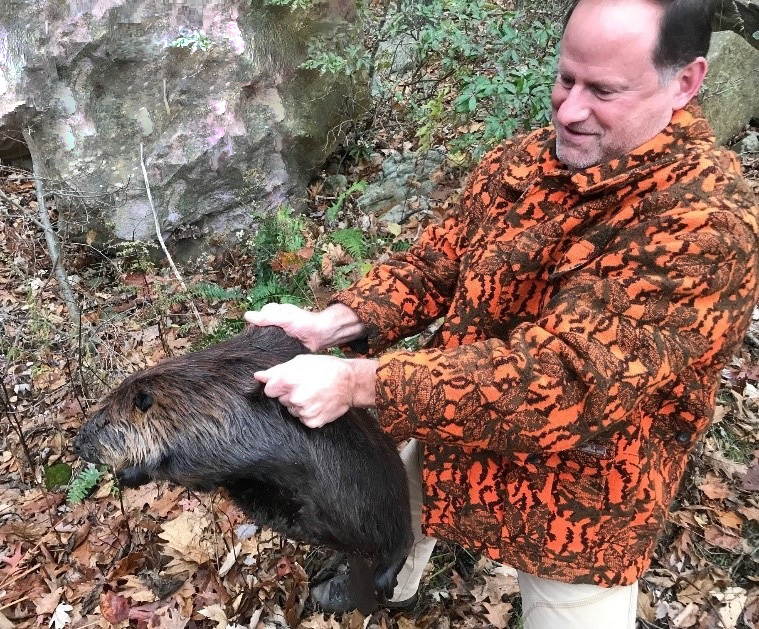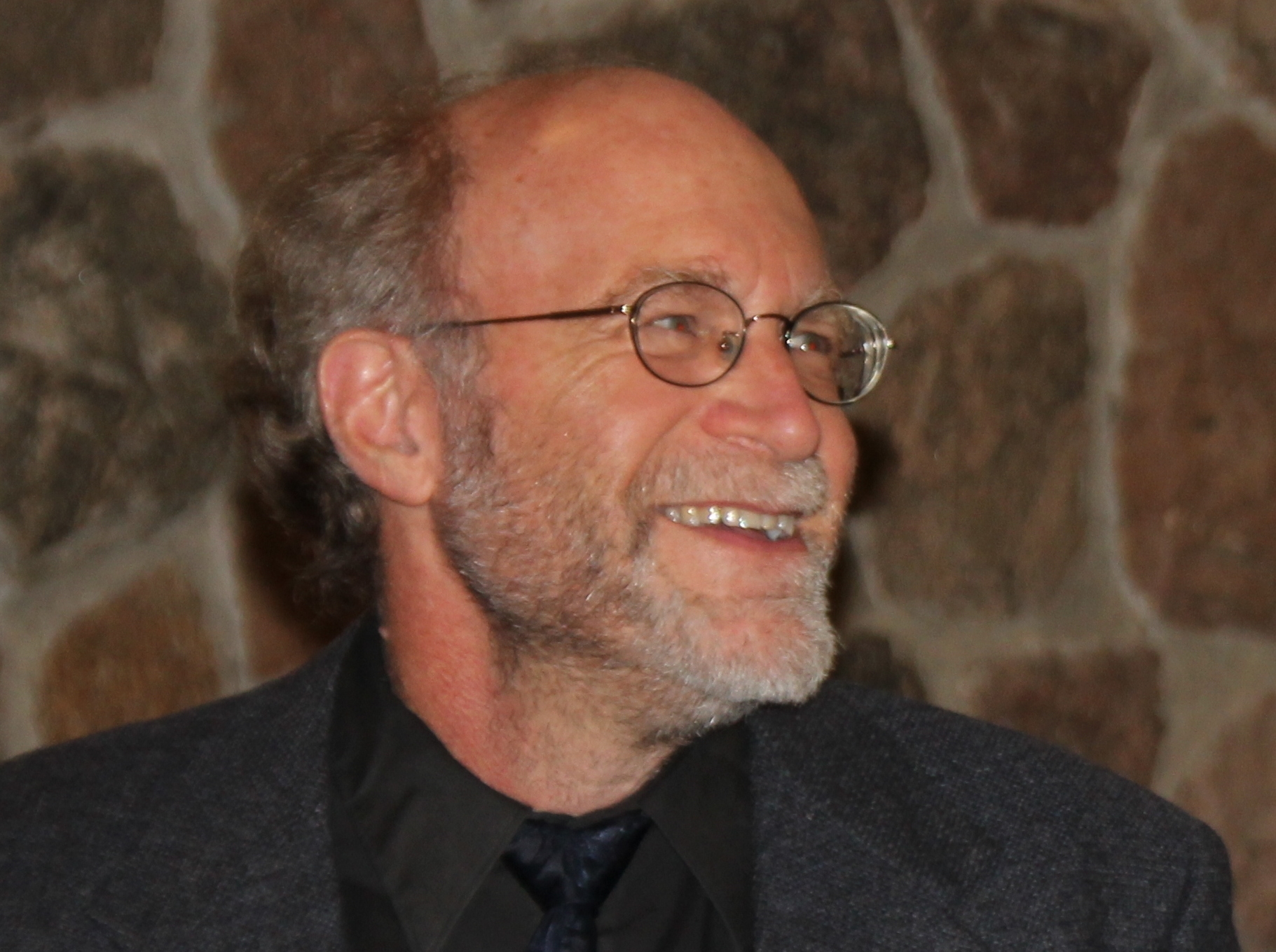On Todd Davis, Coffin Honey, and a Dead Beaver
When I stopped by for a brief visit at Todd Davis’s place on the edge of Altoona, Pennsylvania—just before the pandemic shut so much of regular life down—he had home-made soup on the stove for lunch, along with two kinds of bread and three kinds of cheese. Everything was delicious, and we caught up as we ate. When we headed off to walk in the state hunting preserve nearby, land Todd knows intimately, he insisted I bring the walking sticks he had stashed in his truck. “The slope’s tricky, and the leaves are slippery,” he said. I accepted his guidance gratefully, we had a fine little hike, and as we got back to the truck, he said, “Hey, do you want to see a dead beaver?”
This surprised me somewhat—I’m pretty sure no one else has ever asked me this exact question, before or since—but how could I say no? It turned out that someone had hit a beaver on the road a week or so ago, Todd had happened along and rolled it into the ditch, and sure enough, there it was, still, unmolested and looking quite intact. (It was autumn, and cool.) Without prompting from me, Todd grabbed the beaver and held it up for me to see—not an inconsiderable task. It was a hefty animal, forty or fifty pounds at least. I snapped a few pictures, knowing the story would not play nearly so well without photographic evidence.

Deep down, I’ve always felt like basically a cautious guy, though people who know me might disagree. But I’ve also learned to be on the lookout for those people who have already taken chances that I wouldn’t, done things I’d never even consider, explored ranges of experience that seem just out of bounds to me . . . like picking up week-dead beavers. There’s much to be learned from such people, whatever the immediate circumstances.
I’ve known Todd and followed his poetry for years now—he taught for a while at Goshen College, and we first met at a gathering for Goshen and Bluffton faculty. I’d wondered when I heard that he did his undergrad work at the conservative Grace College in Winona Lake, Indiana; long ago my great-grandpa George Gundy, a Mennonite preacher in central Illinois, had attended evangelical meetings there. But over dinner in the Bluffton dining hall I learned that Todd had gone to Grace mostly to play basketball, and was hardly a hide-bound evangelical. He later left Goshen for a stint at Iowa State, then settled at Penn State Altoona and found a home in the mountains nearby. On his website Todd is careful to note that the land I sloppily mentioned as a state hunting preserve is Pennsylvania State Game Lands 108 and 158, and his deep attachment to the place and the beings that dwell there is central to his poetry.
As we made our way back to the main road, Todd mentioned that he’d been writing a lot of poems about this place, and about a bear, and that he’d had good luck publishing a number of them. Those poems, gathered and organized, have become Coffin Honey, Todd Davis’s seventh book—and it’s more than plain to me why editors snapped them up as they saw them. I have long appreciated his fine-tuned lyricism, knowledgeable attention to the natural world, and deep concern for his fellow beings, human and otherwise, but from the first poem, “If We Have to Go,” this new book felt like a revelation. The tone is apocalyptic: viruses killing off a deer herd, “every part of the world / on fire.” The social awareness is unsparing as well:
Here in the mountains,
near grief nor dreams
will save us: what little water
we have our parents use to green
the lawn and frack the ground.
The hapless boys who speak here can only amuse themselves as the world burns, drinking beer and tossing tires at the dead deer on the roadsides. Like so many of us, they notice the impending disasters around them but feel helpless to address them.
In this ominously vulnerable world we meet a number of recurring characters. Some are people, often young and vulnerable—a girl who hunts with her father and has (at least for now) stopped cutting herself, a boy whose brutal uncle “touches him / in the cellar,” another who researches “the last lynching in Jeff Davis County” with his half-black cousin. But there are animals too—“Hunting with Dogs” begins with an epigraph from Robert Bringhurst that insists “The mind is made out of the animals / it has attended,” and the poem catalogs the human-dog connection all the way back to “Thirty-five thousand years ago, [when] the first pup was snatched from a den-litter.” “The first drawn breath suggests all animals share one soul,” Davis writes, reminding us that humans are also animals, whether we turn from such knowledge or not.
And then there is Ursus, the great bear who wanders through Coffin Honey like a demigod or totem, unruly, un-human, an enigmatic but essential. We first meet him observed by a drone that he eventually destroys, though the poem does not mourn that loss; instead it asks a question crucial to the whole book: “What’s the appropriate / music for extinction?” Perhaps a fugue, or an oratorio, or a nocturne, the poem suggests, but really the answer is the entire book, which is assembled like a musical suite, shifting styles and modes as it moves among its subjects but never veering far from its particular place, its set of characters, and the particular fusion of anger, mourning, love, and craft that Davis brings to every page.
I have yet to speak of Coffin Honey’s many formal variations. The stunning “dream elevator” is paced across the page like an asymmetrical web, shifting its focus from the abused boy mentioned earlier to his mother, who lies in a tub:
water tepid
skin sluffing
scales
like deceit
the secret
knowledge
of her child’s
violation
a heat
that fogged the mirror
I am tempted to keep going, to outline the complex but discernible narrative line that’s one way to read this book, but instead I will merely note that it can also be read several other ways: as a series of character sketches that at time nearly become dramatic monologues; as a “deep ecology” of the region, striving to pay distributed if not utterly balanced attention to the widest possible range of characters and concerns; as lament and elegy for a world that seems like it may well indeed be burning up. “Bears are born understanding the eternal,” Davis claims in “Bog Parable,” another Ursus poem, suggesting both that we humans do not grasp either the eternal nor the tangible, physical world, and that we must pay better attention to those who do.
I began this review with my story about Todd and the beaver, or something like it, to make clear that while I have surely tried to be accurate, I am not an objective reviewer of his work—if such a person exists. I have long thought of Todd Davis as a friend, ally, and fellow traveler in the realm where language and human beings and the ten thousand things and the great mysteries of the spirit are all at stake, all the time. We haven’t saved the world, we poets, but we haven’t broken it either.
In my day I’ve reviewed at least a couple of hundred books for Georgia Review, Christian Century, and other publications, some by famous writers, some not. I almost never agreed to review a book if I didn’t think it was basically worthy; I mostly stuck to those I admired, respected, and even came to love. Especially during my Georgia Review days, this meant setting aside many very good books in favor of ones that seemed truly fine, in some distinctive way. Out of all those books and writers, a few keep coming back to me, sometimes for their technical brilliance, but especially those that offer what Kenneth Burke called “equipment for living.” Terrance Hayes, Brigit Pegeen Kelly, Li-Young Lee, Naomi Shihab Nye, and Leonard Cohen are on that list of writers who became part of my personal canon as I reviewed their work; Todd Davis and Coffin Honey have now joined that company.
Let me say it, then: this is a sad, brilliant, marvelously observed, kaleidoscopic, musical wonder of a book, and I hope everyone who reads this far will buy it and read it, both for pleasure and for instruction. It will make you think about what we’re doing, to the world and each other; it will guide you deeply into a particular, desperate, lonely, beautiful, thriving and threatened place. It may or may not be true that “poetry changes nothing,” as W. H. Auden famously observed, but I can testify that poetry can change people. Where else do we start?
